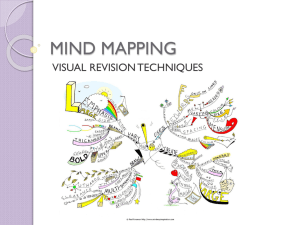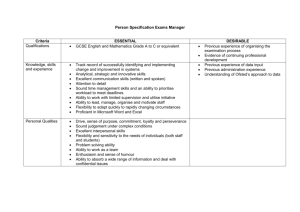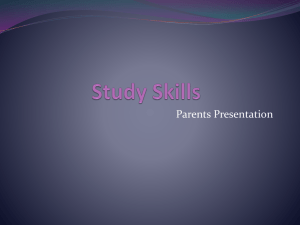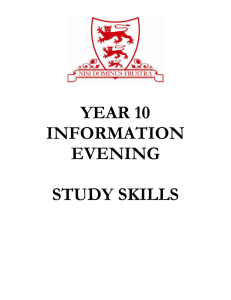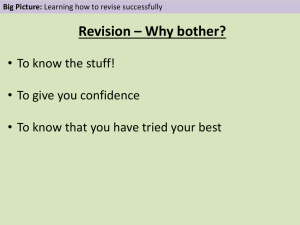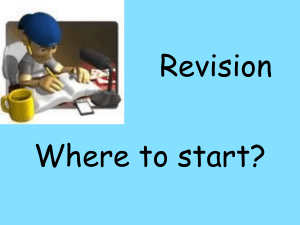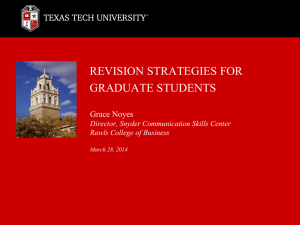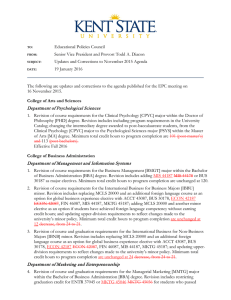Survive Sociology
advertisement
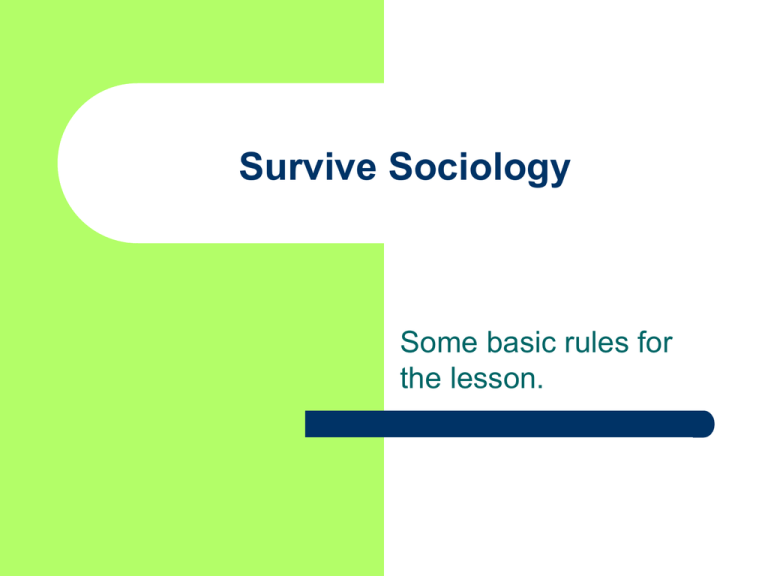
Survive Sociology Some basic rules for the lesson. Examine your attitudes It is time to grow up now. Examine your attitudes to school and to teachers carefully. Do they need adjusting? People who work hard do well. Rules are a chore, but they are there for very good reasons – so follow them. Change your thinking The subjects you study should affect the way that you think about the world. Subjects are known as disciplines because they discipline your mind to think along certain modes of thought. Get into the hang of applying insights from lessons into your real life – and vice versa. Effort You should work at your own success harder than your teacher does. You will get out of a subject the amount of effort that you put into it. The more time you spend on it, the more relaxed you will be and the more successful you will become. Set personal targets The person who benefits from your learning is you … Don’t leave it to other people to organise your work for you. Decide what it is you want to gain from the course and then organise yourself to achieve whatever is needed for personal success. Independent learning Whatever is set in class is the basic minimum needed. Do whatever it is you have been set without putting it off or making excuses. Try and do a bit more as well so that you are learning for yourself and not just because your teacher told you to. Using books You are learning the norms and values of literate and educated people. Behave like these people. Buy books Read books Add notes to books. Go to the LRC and photocopy books. Think about the ideas in books. Be prepared for lessons Make sure that you have been to the toilet, are not hungry, have had a drink and have slept enough. Get your books and notes sorted the night before. Bring a pen and paper to lessons. Check where you are on the topic and refresh your memory of the previous lesson. Turn your mobile off. Work planning You will forget most of what happens in lessons. This is natural and inevitable. Revise from the beginning. Set aside time for revising and reviewing. Plan your time carefully so that you can do this as well as your set work. Organising your learning Buy folders and dividers of different colours. Look at the schemes of work to see what topics are being covered. Keep all notes and exercises together. Use the subject specifications or your teacher’s scheme of work as a guide to what you should know. Cross reference notes. Revision cards Buy some index cards and index files from a stationer. Develop a set of revision cards with a glossary of terms and another for lists of studies as you go along. You will find these invaluable for revision and for organising yourself. Notes The purpose of notes is so that you will read them and revise from them. Make sure that they are neat and well ordered or you won’t have a clue what it was that you did in lessons. Use colours, space them out and make sure that they are clear and easy to understand. Be nice to the teacher If there is a problem, let your teacher know straight away. Most problems can be solved very easily. They usually arise from lack of confidence or very basic misunderstanding. Be grown up – go and have a chat with someone and get the issue sorted. Attendance Poor attendance demotivates both you and your teachers. It affects the learning of the whole class who will have to spend time recapping material that you missed. You will lose the plot in lessons very quickly if you don’t attend. Go to all of your lessons. When you are in the lessons, stay on task and concentrate. Study buddy You cannot and will not learn everything there is to know, so be selective in what you learn. Spend as much time as possible with a study friend and share some of the tasks. Spend time together discussing ideas and the content of lessons. Share notes and essay planning sessions. Current affairs Try and know what is going on in the world. This is the purpose of PSE and General Studies lessons. Read newspapers. Watch the news. Talk to people. Listen and think about what it is you have learned. Relax Build in some time for relaxation and fun. Do sport, go out and do your job if you have one. Get the fun thing into perspective – you have the rest of your life for fun so prioritise work. Being a student at college should be when the real fun begins!
